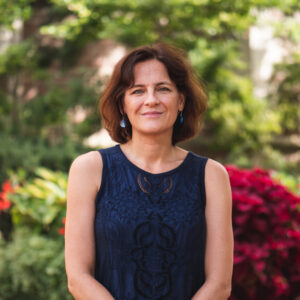Video conferencing technology has enabled novel projects to emerge among scholars and students across international borders. At Washington University, students in Tabea Alexa Linhard’s “Afterlives, Ghosts, and Haunted Places” seminar, a class in the undergraduate curriculum in Spanish, collaborated on a joint research project with students from the Tecnológico de Monterrey, Ciudad de México campus. The exchange–a bilingual mix of shared experiences and diverse perspectives–examined migration in contemporary times.
Linhard, professor of Spanish, global studies, and comparative literature at Washington University, developed the assignment with her colleague Margaret Echenberg at the Tecnológico de Monterrey. At the time, they were both teaching classes on literature and cultural studies. Echenberg’s class in Mexico was taught in English and focused primarily on the United States, while Linhard’s class, taught in Spanish, centered on the Spanish-speaking world. The scholars saw an unusual opportunity for students to work across linguistic and international borders on a shared project.
“We asked the students to produce short podcasts related to migration in the contemporary era,” said Linhard, whose current research also involves migration, but in the 1930s and 1940s. “While our courses weren’t entirely about migration, we each had a unit on that topic built into our courses already, and so we decided to focus our collaboration on stories that involved migration.”
What I liked best about the project, with all its imperfections, was that it was completely and unapologetically bilingual and that it allowed the students to discuss migrations from ‘both sides of the border.’
Tabea Alexa Linhard
Ale Uriostegui, a student in Linhard’s seminar, wrote a poem about her family’s experience with migration as part of the final project.

“In our podcast episode, our group created a space to analyze immigration through anecdotes, literature, and policy. The project gave me the opportunity to reflect on my family’s immigration experience and share these reflections in a poem,” Uriostegui said. “The Global Classroom project illustrated the importance of approaching immigration through different lenses with different people, as every lens and person offers fruitful insight to spark discourse and provoke inquiries that lead to meaningful change.”
Linhard was introduced to Echenberg several years ago by a common friend. When they saw each other at a conference in Buenos Aires in 2019, they decided to collaborate. It seemed a natural move given that Tec de Monterrey is one of Washington University’s partner institutions in the McDonnell Scholars International Scholars Academy.
Their collaboration was supported by the Global Classroom initiative at the Tec de Monterrey. Modeled after similar programs at the State University of New York, the Global Classroom initiative provides faculty at the Tec de Monterrey with technological resources and training to partner with colleagues at a foreign university in designing a classroom experience.
“Coming up with a draft for the script, revising it, and recording it exposed the students to new and perhaps unexpected perspectives on migration,” Linhard said. “Moreover, the fact that WashU students worked in Spanish and Tec students in English meant that nobody was in their comfort zone, which ended up being a good learning environment for everybody.”
